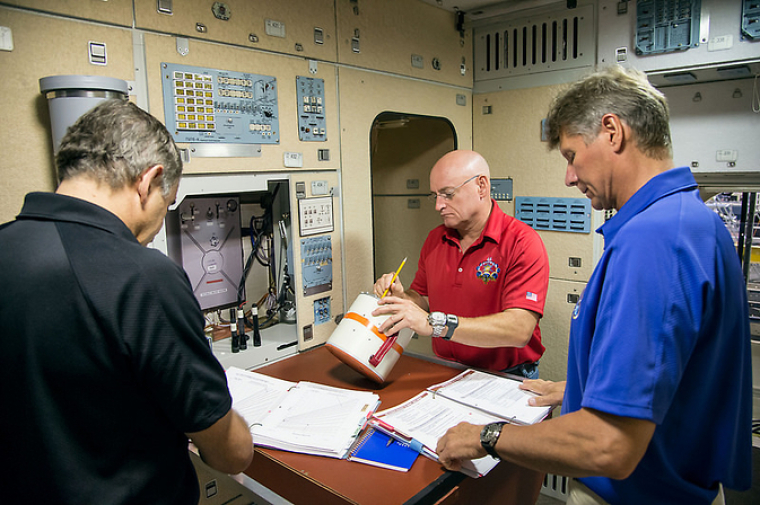2 Spacemen To Orbit Earth For 12 Months To Test Long-Term Effects Of Flight On Body

For the first time, the National Aeronautics and Space Administration will embark on a mission to the International Space Station (I.S.S.) that will run for a year to test the physiological and psychological effects of long-term space flight.
In a statement, NASA revealed that astronaut Scott Kelly and Russian cosmonauts Mikhail Kornienko and Gennady Padalka are set for launch on March 27.
The American space agency added that the three will board a Russian Soyuz spacecraft from Roscosmos, noting that Padalka will return to Earth in September while Kelley and Kornienko will remain on board to orbit Earth for a year until March 2016.
"The valuable scientific data collected will provide insight into how the human body responds to longer durations in space, supporting the next generation of space exploration," NASA said in a statement.
The year-long mission also hopes to see how the human body will bear up on future voyages to a distant asteroid or Mars without the benefits of artificial gravity, which might last several months, the Guardian reported.
Scientists earlier found out that extended periods spent in microgravity are known to cause increased bone and muscle loss, reduced heart and artery function and impaired sensory motor performance.
Dr. Michael Barrat, who works at NASA's Human Research Program at the Johnson Space Center, noted that the mission will also "build on the rich experience of long-duration flights, including four flights of a year or more conducted by our Russian colleagues on the Mir station."
"We have progressed considerably in our understanding of the human physiology in space and in countermeasures to preserve bone, muscle and fitness since then. The space station program provides us a robust framework for international collaboration that enables us to realize tremendous returns from such an experience," Barrat said, according to the Guardian.
Meanwhile, International Science Office's program chief John Charles said data from six-month spells in space did not suggest that the human body adjusts to a new adapted state over that period of time.
"This one-year mission opportunity will show if the trends continue as before or if we are approaching any 'cliffs' that will require new treatments while providing new insights," Charles explained.
During the mission, Kelly and Komienko will work alongside three European Space Agency astronauts – including the British former test pilot Timothy Peake, whose launch is scheduled for December.
 Christians don't have to affirm transgenderism, but they can’t express that view at work: tribunal
Christians don't have to affirm transgenderism, but they can’t express that view at work: tribunal Archaeology discovery: Medieval Christian prayer beads found on Holy Island
Archaeology discovery: Medieval Christian prayer beads found on Holy Island Presbyterian Church in America votes to leave National Association of Evangelicals
Presbyterian Church in America votes to leave National Association of Evangelicals Over 50 killed in 'vile and satanic' attack at Nigerian church on Pentecost Sunday
Over 50 killed in 'vile and satanic' attack at Nigerian church on Pentecost Sunday Ukrainian Orthodox Church severs ties with Moscow over Patriarch Kirill's support for Putin's war
Ukrainian Orthodox Church severs ties with Moscow over Patriarch Kirill's support for Putin's war Islamic State kills 20 Nigerian Christians as revenge for US airstrike
Islamic State kills 20 Nigerian Christians as revenge for US airstrike Man who served 33 years in prison for murder leads inmates to Christ
Man who served 33 years in prison for murder leads inmates to Christ


 Nigerian student beaten to death, body burned over ‘blasphemous’ WhatsApp message
Nigerian student beaten to death, body burned over ‘blasphemous’ WhatsApp message 'A new low': World reacts after Hong Kong arrests 90-year-old Cardinal Joseph Zen
'A new low': World reacts after Hong Kong arrests 90-year-old Cardinal Joseph Zen Iran sentences Christian man to 10 years in prison for hosting house church worship gathering
Iran sentences Christian man to 10 years in prison for hosting house church worship gathering French Guyana: Pastor shot dead, church set on fire after meeting delegation of Evangelicals
French Guyana: Pastor shot dead, church set on fire after meeting delegation of Evangelicals ‘Talking Jesus’ report finds only 6% of UK adults identify as practicing Christians
‘Talking Jesus’ report finds only 6% of UK adults identify as practicing Christians Mission Eurasia ministry center blown up in Ukraine, hundreds of Bibles destroyed: 'God will provide'
Mission Eurasia ministry center blown up in Ukraine, hundreds of Bibles destroyed: 'God will provide' Church holds service for first time after ISIS desecrated it 8 years ago
Church holds service for first time after ISIS desecrated it 8 years ago Burger King apologizes for 'offensive campaign' using Jesus' words at the Last Supper
Burger King apologizes for 'offensive campaign' using Jesus' words at the Last Supper Uganda: Muslims abduct teacher, burn him inside mosque for praying in Christ’s name
Uganda: Muslims abduct teacher, burn him inside mosque for praying in Christ’s name